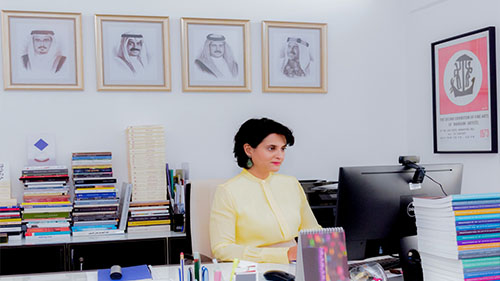Contact Center
.
22 June 2020
H.E Shaikha Hala Bint Mohammad Al-Khalifa, as Bahrain Culture Authority Representative, Takes Part in the Extraordinary Virtual Meeting on Intangible Cultural Heritage in Arab Countries


H.E Shaikha Hala bint Mohammed Al Khalifa, Director General of Culture & Arts, at BACA and representing the Kingdom of Bahrain, has participated, on 22 June 2020, in in the Extraordinary Virtual Meeting on Intangible Cultural Heritage in Arab Countries, attended by excellences heritage directors and managers.
The Arab League Educational, Cultural and Scientific Organization (ALECSO) held this online remote meeting to discuss ways and means of safeguard and preservation of the intangible cultural heritage in the Arab world amid the exceptional circumstances dictated by the Covid-19 virus global pandemic. The latest worldwide developments and how the world is coping with this pandemic crisis and its impact on this sector, mostly affected by the lockdown measures, were also discussed during the meeting.
During her intervention, H.E Shaikha Hala bint Mohammed Al Khalifa, said: “While we undergo one of the most ever hard -hit crises on cultural sectors worldwide, we need really to stand firmly together to enhance and boost the cultural action in our Arab world and face this challenging virus pandemic”. H.E rejoined: “The Intangible Cultural heritage is part and parcel of our historical identity given its universal richness, reflecting the exceptional promotional beautiful image of our Arab world. Therefore, we should and we have to pay our attention towards its safeguard and preservation, especially amid the Corona virus outbreak that has affected all cultural and creative productive sectors”
H.E Shaikha Hala bint Mohammed Al Khalifa has asserted that the Kingdom of Bahrain, and Bahrain Authority for Culture & Antiquities give the intangible cultural heritage the highest priority, adding that the Kingdom of Bahrain has succeeded to take the lead and play a pioneering role in the safeguard and preservation this part of World Heritage, locally and regionally. H.E has also pointed out that Bahrain has participated in the nomination and presentation of two Arab files to be registered on the UNESCO Intangible Cultural Heritage List, namely “Al-Nakhla (Palm Tree) file and Arab Calligraphy “dossier. In addition, Bahrain Culture Authority held the 1st National Intangible Cultural Heritage meeting last quarter of 2019, H.E said, working today on finalizing the “ Fijri Art” nomination file to be the first Bahraini item to be registered on UNESCO Intangible Cultural Heritage List. H.E Shaikha Hala bint Mohammed Al Khalifa praised Bahrain’s exceptional efforts in rendering the Arab and Islamic Intangible Cultural heritage an international hotspot, succeeding in its proposal to name and fix 18 November of every year, as an International Islamic Art Day by UNESCO in 2018, when Muharraq was celebrated as the Capital of Islamic Culture.
Commenting on the challenges and difficulties dictated by this virus pandemic and the need to enhance efforts aimed at preservation of intangible cultural heritage in the Arab world, H.E Shaikha Hala bint Mohammed Al Khalifa, said that the new communication and information tools, virtual platforms and social media networks offer us a safe haven for flourishing cultural action development. Indeed, these ICTs tools have contributed in promoting Arab cultural assets in the past and can offer limitless opportunities, in the present, to host a comprehensive Arab archives documenting the intangible cultural heritage, such as the performing traditional folk arts, poplar storytelling, the genuine cooking and cuisine traditions etc, H.E added
Worth to mention that, the Kingdom of Bahrain ratified the Convention for the Safeguarding of the Intangible Cultural Heritage on 7 March 2014. The purposes of this Convention are the safeguard the intangible cultural heritage; which is compatible with existing international human rights instruments, as well as with the requirements of mutual respect among communities, groups and individuals, and of sustainable development. Three lists are mentioned in this convention ; the Intangible Cultural Heritage List that requires Urgent safeguarding List , the Representative Intangible Cultural Heritage List, Register of Best Practices.
...







